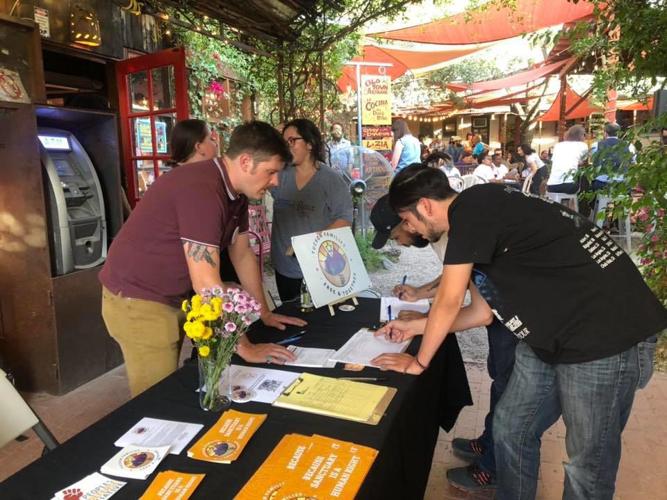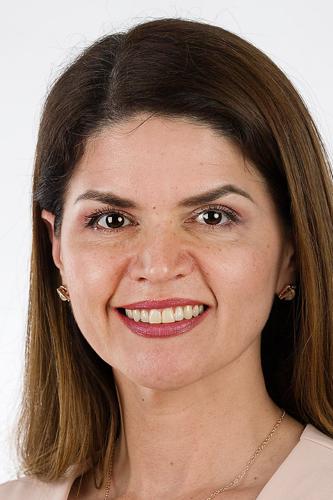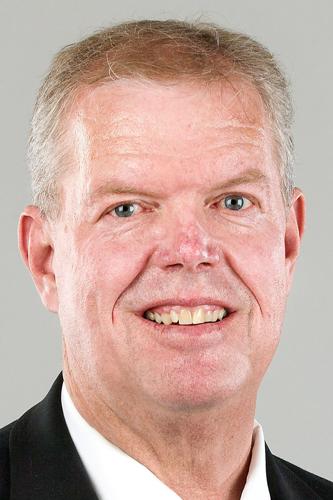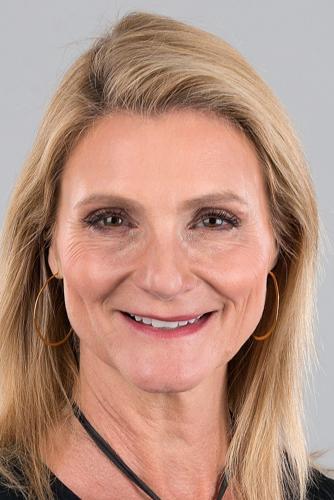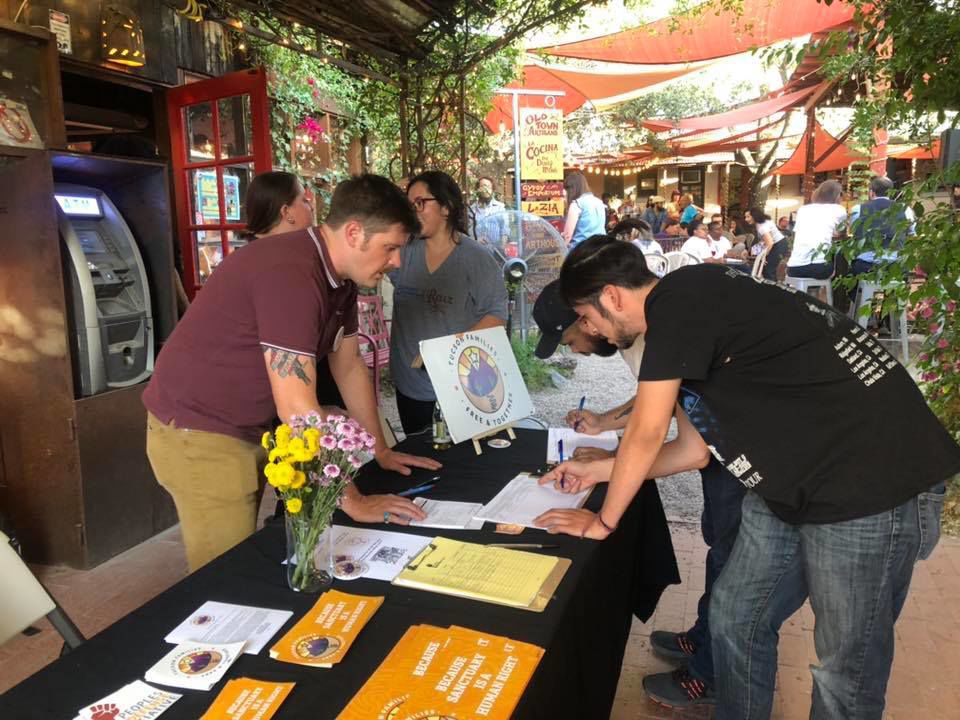The four candidates vying to be Tucson’s next mayor clashed on public safety and roads, but were able to agree on one topic at a debate Wednesday.
At the debate organized by the Rotary Club of Tucson, all the candidates were reluctant to talk about the “sanctuary city” ballot initiative — which they all oppose.
Supporters of the initiative say it would put the force of law behind many guidelines already in place here about circumstances under which police can ask about immigration status, among other measures. The signatures that qualify it for the ballot are currently under court challenge by the Pima County Republican party.
Moderator Lorraine Rivera, the host of Arizona 360 at Arizona Public Media, pushed each candidate to talk about the initiative, called Tucson Families Free & Together, and what they would do to protect it from legal challenges if it passes in November.
Former state senator Steve Farley said he “rejects the premise of the question” and spent most of his two-minute answer talking about his opposition to the initiative.
“The more people in Tucson understand how bad this could be for us, this initiative is not going to win,” said Farley, a Democrat. But he added, “We can’t take that for granted.”
He did not answer how he’d defend the initiative if it passes.
City Councilwoman Regina Romero, also a Democrat, said she helped to make Tucson an “immigrant-welcoming” city and modified internal policies inside the Tucson Police Department to be more friendly to immigrants.
“I’ve led on those issues and they are very important to this community, but I vehemently oppose the sanctuary city initiative because of that language,” she said.
Romero said the city could lose as much as $130 million in state-shared revenue annually if the initiative passes because the Republican-controlled Legislature would penalize the city. She noted that a state legislator has already threatened to sue the city if it passes.
She said if the initiative passes, she would establish a legal plan to protect the city’s finances.
Developer Randi Dorman was less reluctant to answer but told the audience first that she did not support the initiative, has deep concerns about the loss of state-shared revenues and would prefer to work directly with the Tucson Police Department on the issue than be bound by a voter mandate.
“If the initiative passes, that is the will of the people and we have to manage that. If the state interferes, we will have to use legal defense and creative ways to maintain our state-shared revenue,” said Dorman, a Democrat.
Ed Ackerley, who co-owns Ackerley Advertising, said he also opposes the initiative and labeling Tucson as a sanctuary city.
“It is not in the long-term best interests of the city of Tucson,” Ackerley said.
Ackerley, the only independent in the four-person race, said he would legally defend the measure if it passes in November, but said he expects subsequent legal challenges next year if it does.
“It is going to be a mess,” Ackerley said.
He said that in addition to a legal defense, the city will need a public relations strategy, as well.
“We have to have a plan in place to mitigate the harm that will happen to us nationally in the news and in terms of our finances,” Ackerley said.
Rivera complimented each of the candidates for being “verbal ninjas” but cast doubts that any of them answered her direct question.
Later in the debate, the candidates all agreed that the Tucson Police Department is underfunded, but diverged on specific policies to increase staffing and stem the number of officers leaving every month.
Farley told the audience that the city needs more staffing in the Police Department.
“There is no doubt we are at a crisis. We have 30% fewer commissioned officers on the street than we did in 2005. Our response times are too long,” Farley said.
He committed to hiring more officers and firefighters but did not offer specifics in his two-minute answer beyond saying he would make public safety a priority in the city budget.
“We need to have our police and our fire departments up where they can actually serve us and keep us safe,” Farley said. “I will make sure that nothing is being squirreled away while public safety is being underfunded at the city.”
Dorman agreed the city should hire more officers.
“Our staffing levels are way too low. We should be closer to 20 to 25 police officers for every 10,000 people and we are not close to that yet,” Dorman said.
Dorman suggested that the city could give officers who live inside the city limits an annual $5,000 bonus as well as allow officers to take their patrol vehicles home.
“Many of our police officers don’t live here and our neighborhoods are safer when police officers live in those neighborhoods,” Dorman said.
She floated the idea of asking Tucsonans to extend a voter-approved half-cent sales tax that is partially dedicated to law enforcement, saying she’d use some of those funds to pay for her proposals.
Romero told the audience that she has been working for years on the council to support law enforcement.
“This is one of the instances when having someone who has experience on the Tucson City Council will help,” Romero said.
She blamed a pension crisis and the Great Recession for the staffing issues, saying the cash-strapped city couldn’t keep up with new hires and raises for employees over the last decade.
However, she said, the council backed raises for police officers and firefighters last year to address staffing issues.
“Just last year we invested $3.5 million for our police officers, raised their wages above the 2.5% increase that we gave city workers,” Romero said. “We did the same thing for the Fire Department. Another $3.5 million to raise their wages and deal with compression issues.”
Acklerly said the city could help divert nonemergency calls that tie up services by educating “the population on what they can do the help mitigate calling the 911 service every time there is a cat up the tree.”
He also said he wants to reduce the use of four-man crew responses to emergency calls, saying he’d like to establish two-man rescue crews that respond in smaller, less-expensive-to-operate vehicles for some types of calls.
“For people who don’t need extreme, life-saving care, just need someone to check on them to make sure they are OK, instead of sending a large truck, we send a small vehicle,” Acklerly said.
All four candidates, when asked about city roads, agreed that they want to see greater funding go into fixing streets, but each said they did not want to raise taxes.
Several said they were willing to ask voters to extend the half-cent sales tax when it expires, but that would be at least two years from now. Part of the revenue from that tax goes to roads.
Ballots for the mail-only Aug. 27 primary election will be sent out on Aug. 2.
Because no Republicans are running for mayor, the winner of the Democratic primary will face Ackerley in the November general election.


